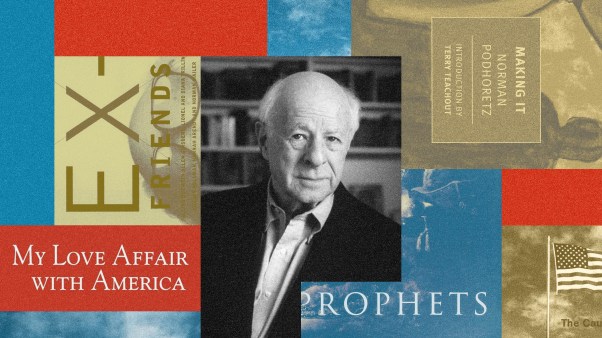Paula White is a pastor, the television host of Paula Today, the president of Paula White Ministries and the National Faith Advisory Board, and the leader of the White House Faith Office. This week White released a video encouraging Christians to celebrate Passover in order to unlock seven supernatural blessings. Calling the Passover season “one of the most exciting, life-changing, miracle-working seasons of the whole year,” White identifies seven blessings from Exodus 23:14–30 for those who align themselves with God’s desires.
According to White, God will (1) “assign an angel to you,” (2) “be an enemy to your enemies,” (3) “give you prosperity,” (4) “take sickness away from you,” (5) “give you a long life,” (6) “bring increase and inheritance,” and (7) “give a special year of blessing.”
Before I weigh in on this list, I must say I agree that the Old Testament Scriptures are relevant for the church. Passover holds huge significance for our faith, marking the time when God delivered the people of Israel from their oppression in Egypt. Christians are invited (though not commanded) to observe this feast and the others listed in Exodus 23. But to suggest that keeping the Passover automatically unlocks supernatural blessings is deeply problematic.
First of all, God does not promise to send an angel to those who keep the Passover in any age. The first verse in question is God’s message through Moses addressed to the Israelite community as they prepared to leave Mount Sinai and travel to Canaan. In fact, of all the instructional material in Exodus, the section on angels (23:20–33) has a clear expiration date.
Following chapters of laws that would govern God’s people for centuries to come, verses 20–33 address the more immediate question of how the Israelites would complete their journey to the land of Canaan and what they should do when they arrive. God promises to send an angel to guide that particular generation through the wilderness to the Promised Land. In no sense is this a personal promise of protection to individuals—either then or now. Its central concern is to prepare the Israelites to smash the idols of false worship that pollute the land of Canaan.
Ironically, one of the central questions of Exodus 33–34 is whether Yahweh will accompany the people from Mount Sinai. Moses persistently intercedes for God’s forgiveness after the people’s sin with the golden calf. His deepest desire is for God himself to accompany them (33:15–16).
When God announces that he will send an angel instead of accompanying the people himself, it is a concession—not as good as his actual presence, but a bit safer since they were so rebellious and might incur God’s judgment along the way (33:1–3). Moses is determined not to rest until God agrees to accompany them directly, so for an angel to lead them instead would have actually been a grave disappointment.
By promising an angel of protection to her viewers, White misses something even more important. As members of the new covenant, believers in Jesus have the treasure of God’s presence daily in the person of the Holy Spirit, who provides us with guidance, accountability, and protection. Because of Christ’s sacrificial death, we have already been rescued from sin and death, and we now have God’s own presence with us. Nothing more is needed, either to protect our present or to secure our future.
Second, White promises that God will “be an enemy to your enemies” (Ex. 23:22). Again, God is speaking directly to the ancient Israelites and using language typical of ancient treaties to signal his promise of loyalty in battle. Even then, God qualifies this promise later on. When Joshua encounters the angel of the Lord, the captain of heaven’s armies, on his way to Jericho, the angel makes clear that God is not ultimately beholden to anyone (Josh. 5:13–15).
As always, the right biblical question is not whether God is on our side but whether we’ve aligned ourselves with his purposes. Celebrating the Passover didn’t automatically mean Israel would win every battle. Their military victories depended entirely on their paying close attention to God’s instructions and demonstrating absolute obedience (see Ex. 23:21–22). In fact, shortly after celebrating the Passover in Joshua 5:10–11, Israel loses the battle against Ai (7:3–5).
Third, White says God will bring people prosperity. Exodus 23:25 reads, “his blessing will be on your food and water.” But let’s think about this: Bread (or some other staple) and water are the bare minimum a person needs to stay alive. The way White talks about God’s blessing, one would think God had promised a grande iced coconut latte with extra whip or a fine steak dinner with roasted asparagus and a premium bottle of wine.
In other words, God didn’t promise his people an elite lifestyle. He ensured them the basics—bread and water.
White goes on to list other blessings as well: God will “take sickness away” (see 23:25) and “provide an increase” (see 23:30). She says God will “give you a long life” (see 23:26), which is not what the text says at all. To say God will “fulfill the number of your days” (v. 26, author’s translation) implies that God will ensure that your life is not cut shorter than he planned. Your life is in his hands.
Perhaps the most baffling of the blessings that will supposedly be unlocked by celebrating the Passover is the “special year of blessing” (see 23:29). Here, God explains that the people will not have immediate victory over their enemies in the land. Instead, he says he will drive out the other nations “little by little” (v. 30) so that the wild animals don’t overtake the areas of land that the Israelites are not yet ready to occupy.
This suggests the Israelites need to be ready for a long, hard slog during which they will continue to live in tents and forage for food and fight battles and wait for the ultimate fulfillment of God’s promises. I doubt many of them would look back on that first year in the Promised Land as “a special year of blessing.” In fact, that was the year they would learn how to wait and trust. They learned the hard way how essential it was to obey God’s commands. They wondered if this new place would ever really feel like home.
In short, Exodus 23 is not a timeless set of universal principles available to any individual in any age who wants to access God’s blessings. It is a specific set of instructions for the Exodus generation, preparing them for the unique and unrepeatable event that involved coming into the land. And although we can learn about God and his purposes from reading Exodus 23, we are not the audience of this message. We cannot simply retrofit it to access supernatural blessing today.
The blessings White rattles off in the video are problematic in many ways, but her website takes it to the next level. There, White identifies the two keys that will unlock these blessings: (1) placing the blood of Jesus over your household and (2) giving to her ministry.
The first is by analogy with the blood of the Passover lamb, described in Exodus 12—where those who painted lamb’s blood on their doorposts came under the Lord’s protection when the destroying angel came through Egypt on the night of the Passover.
By trusting in Jesus for salvation, believers and their households are under the protection of his blood. I have no quibble with this particular analogy. The New Testament authors make the same parallel (1 Cor. 5:7–8).
But White subsequently co-opts another verse from this chapter to raise money for her own ministry. In Exodus 23:15 (and Deut. 16:16), God warns the ancient Israelites not to appear at the tabernacle at festival time without an offering. White must have seen an opportunity here.
She has already appealed to people’s desire for health and prosperity. In a classic televangelist move, White suggests that those who want to experience God’s seven supernatural blessings today in this special Passover season should give to Paula White Ministries. She writes, “Honor God during Passover with your best offering, I believe He will release His blessings over your life.” This is a bridge too far.
Her message is a familiar one: Prosperity is yours for the taking. All you must do is write a check, and you’ll have heaven’s armies backing you up. The self-absorption of White’s vision for the Christian life fits hand in glove with the rampant individualism that fuels our consumer society. It’s the American dream with biblical background music.
But that vision is frighteningly selective. Where is the surrender? The commitment to faithfulness? The keeping of promises? The willingness to die to ourselves? The radical hospitality? The giving to others who cannot repay? Where is the intolerance for idolatry? The deep solidarity with the most vulnerable members of society, including immigrants, widows, and the fatherless?
White’s vision appeals to the self-centeredness in each one of us, offering self-actualization and self-fulfillment in the name of spirituality. In her way of seeing the world, God is at our beck and call to carry out our purposes.
For example, White held a prayer vigil during the 2020 election in which she dispatched angels of Africa and South America to come swiftly to Washington to prevent the election from being stolen from Donald Trump. She prophesied victory for him then, although Joseph Biden went on to win the election.
The version of Christianity White has on offer is little more than a narcissistic form of consumer capitalism under a thin guise of religion. Don’t like the hand you’ve been dealt? Declare and decree a brighter future! Claim that promotion! Cancel that diagnosis! Step into your destiny! Self-denial and service are only attractive options if they can become a photo op to inspire more donations.
White’s website is soaked in Western consumerism, offering Paula-themed gifts in return for donations to her ministry. The longer version of the Passover video, available on her website, has White sitting at a bistro table on the church stage with two “Paula” mugs on the table next to her Bible. In other words, Paula White Ministries is what happens when a lifestyle influencer becomes a national church leader.
By contrast, the way of the Cross doesn’t sell or promise us earthly blessings—yet it’s the way into which we have all been called, come what may.
Carmen Joy Imes is associate professor of Old Testament at Biola University and author of Bearing God’s Name, Being God’s Image, and a forthcoming book, Becoming God’s Family: Why the Church Still Matters.













